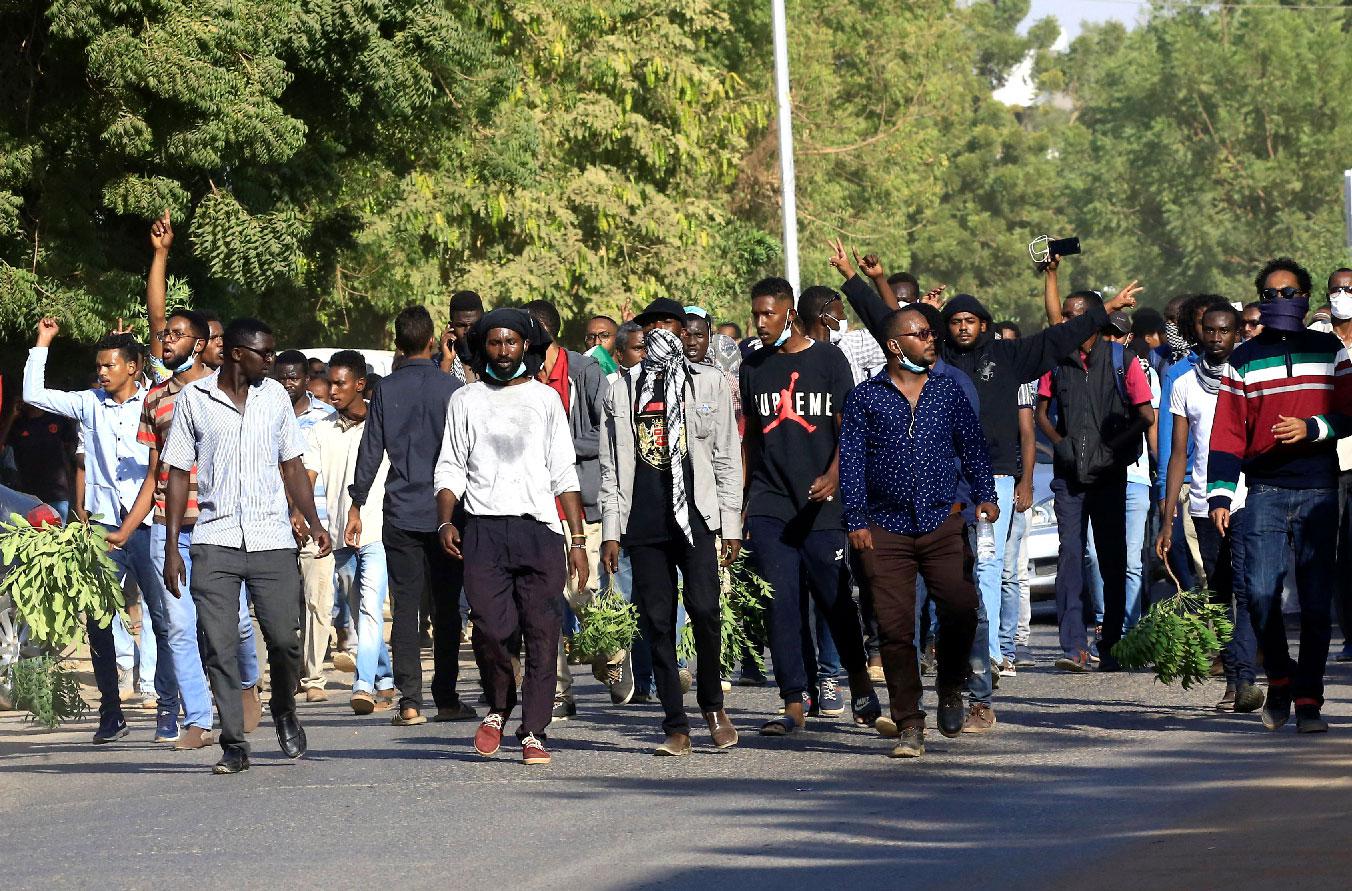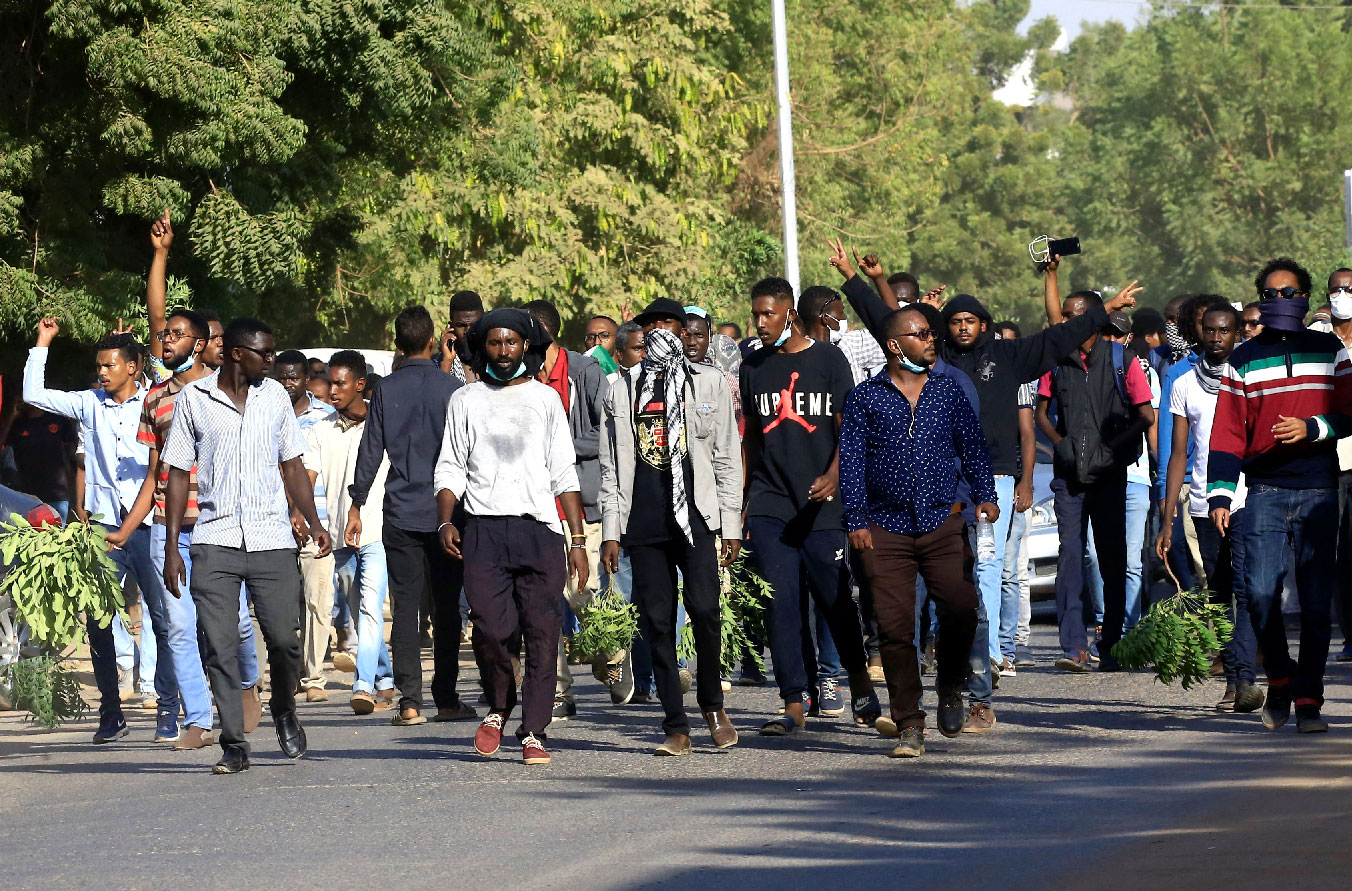Police deploy in Sudan as protesters march
KHARTOUM - Clashes erupted Tuesday in the Sudanese capital between police and thousands of protesters attempting to march on the presidential palace to demand that President Omar Bashir step down, according to activists and video clips posted online.
The video footage purported to show crowds of several hundred each gathering on side roads and headed toward the palace on the bank of the Blue Nile in the heart of Khartoum.
They sang patriotic songs and chanted "Peaceful, peaceful against the thieves" and "The people want to bring down the regime." The latter was the most popular slogan of the 2010 and 2011 Arab Spring revolts.
Large numbers of security forces were deployed across much of Khartoum in anticipation of the march, with soldiers riding in all-terrain vehicles. Police used tear gas to disperse some of the protesters.
The protest was called by an umbrella of independent professional unions and supported by the country's largest political parties, the Umma and Democratic Nationalist.
Hospital workers were the first to take part in the doctors’ walkout on Monday morning, according to Mohammed al-Assam, a member of a committee of doctors. The protest's organizers said they want to submit a petition demanding that Bashir, in power for 29 years, step down.
Tuesday's march follows nearly a week of protests initially sparked by rising prices and shortages of food and fuel, but which later escalated into calls for Bashir to go. The Sudanese leader was in the al-Jazeera region south of Khartoum on a previously scheduled visit Tuesday. Live TV coverage showed him addressing supporters there.
But reports said rallies had also erupted in two cities in al-Jazeera. Residents of Manaqil and Rufaa cities said that dozens took to the streets in Manaqil, calling for the fall of Bashir’s regime. In Rufaa, protesters blocked the streets and burned tyres. Witnesses said police armed with batons dispersed the protests.
'Popular and peaceful'
Bashir has vowed to “take real reforms to guarantee a decent life for citizens,” in quotes carried by the official SUNA news agency.
But the petition presented by the protesters demands that he hand over power to a "transitional government of technocrats with a defined mandate agreed upon by all segments of the Sudanese society."
"We are asserting that we will continue to exercise all popular and peaceful options, including general strike and civil disobedience, to bring down the regime," it said.
The march followed a joint statement Monday night by the United States, Britain, Norway and Canada, which said they were concerned by "credible reports" that Sudan's security forces have used live ammunition against demonstrators.
They urged all parties to avoid violence or the destruction of property while affirming the right of the Sudanese people to peacefully protest to express their "legitimate grievances."
Eight people have died in demonstrations in the eastern cities of Al-Gadaref and Atbara since Wednesday, during clashes with security forces, according to government officials and witnesses.
But others including rights groups and activists have spoken of higher death tolls.
Opposition leader Sadiq al-Mahdi said on Saturday that 22 people had died, denouncing what he called “armed repression” against a legitimate protest movement.
Mahdi, Sudan’s last democratically elected prime minister, was overthrown in a coup that brought Bashir to power in 1989.
Pushed into exile several times, Mahdi returned to his homeland on Wednesday, the day the protests began. He has also called for Bashir's government to go.
'Political roots'
“The main reason for the protests is economic and linked to high prices but the roots of the economic crisis are political,” said Abdellattif al-Bouni, a political science professor.
“The political failures of the government, errors and bad management” explain why people are so angry, he said.
In January, protests erupted against the high price of basic foodstuffs, but were quickly quelled by the authorities, which arrested opposition leaders and militants.
Bashir on Monday said his government would introduce measures to remedy the economy and "provide citizens with a dignified life." He also warned citizens against what he called "rumor mongers."
The military vowed Sunday to rally behind Bashir and emphasized in a statement that it was operating in harmony with the police and Sudan's feared security agencies.
The protests over the past week have been met with a heavy security crackdown, with authorities arresting more than a dozen opposition leaders, suspending school and university classes, and imposing emergency rule or nighttime curfews in several cities. There has also been a near-total news blackout on the protests.
Bashir, in his mid-70s, has ordered the use of force against protesters in the past — including in the last round of unrest in January — successfully crushing them to remain one of the longest-serving leaders in the region. Although his time in power has seen one crisis after another, he is seeking a new term in office, with loyal lawmakers campaigning for constitutional amendments that would allow him to run in the 2020 election.
Sudan is mired in economic difficulties including an acute foreign currency shortage and soaring inflation. The crisis has worsened despite the lifting of an economic embargo by the United States last October.
Inflation is running at close to 70 percent and the Sudanese pound has plunged in value, while shortages have been reported across several cities including Khartoum.
Reforms
Sudan lost three quarters of its oil wealth when the mainly animist and Christian south seceded in 2011 after a long and ruinous civil war against the mainly Muslim and Arab north. More recently, a currency devaluation caused prices to surge and a liquidity crunch forced the government to limit bank withdrawals, leading to long lines outside ATMs.
For Mohamed Lattif, a political columnist for the Al-Youm Al-Tali newspaper, scarce state resources and the entrenched economic crisis must now result in political reform.
“There is no choice but to look again at the leadership structure,” Lattif said.
What comes after the protests depends on the government, he said.
“If they persist with a security response… we will also see an escalation by the other side,” he said.
Indicted by the International Criminal Court for crimes against humanity, war crimes and genocide in Sudan’s western Darfur provinces, Bashir is seen by experts as an authoritarian and volatile leader.
The ruling National Congress Party has said it understands the population’s anger over the economic situation.
But spokesman Ibrahim el-Sadik also accuses Israel of being behind the protests, alongside “left-wing parties that hope to destabilise the state”.
Sudan’s government, like others in the region, often says interference by foreign powers — particularly the US and Israel — guides domestic unrest.



